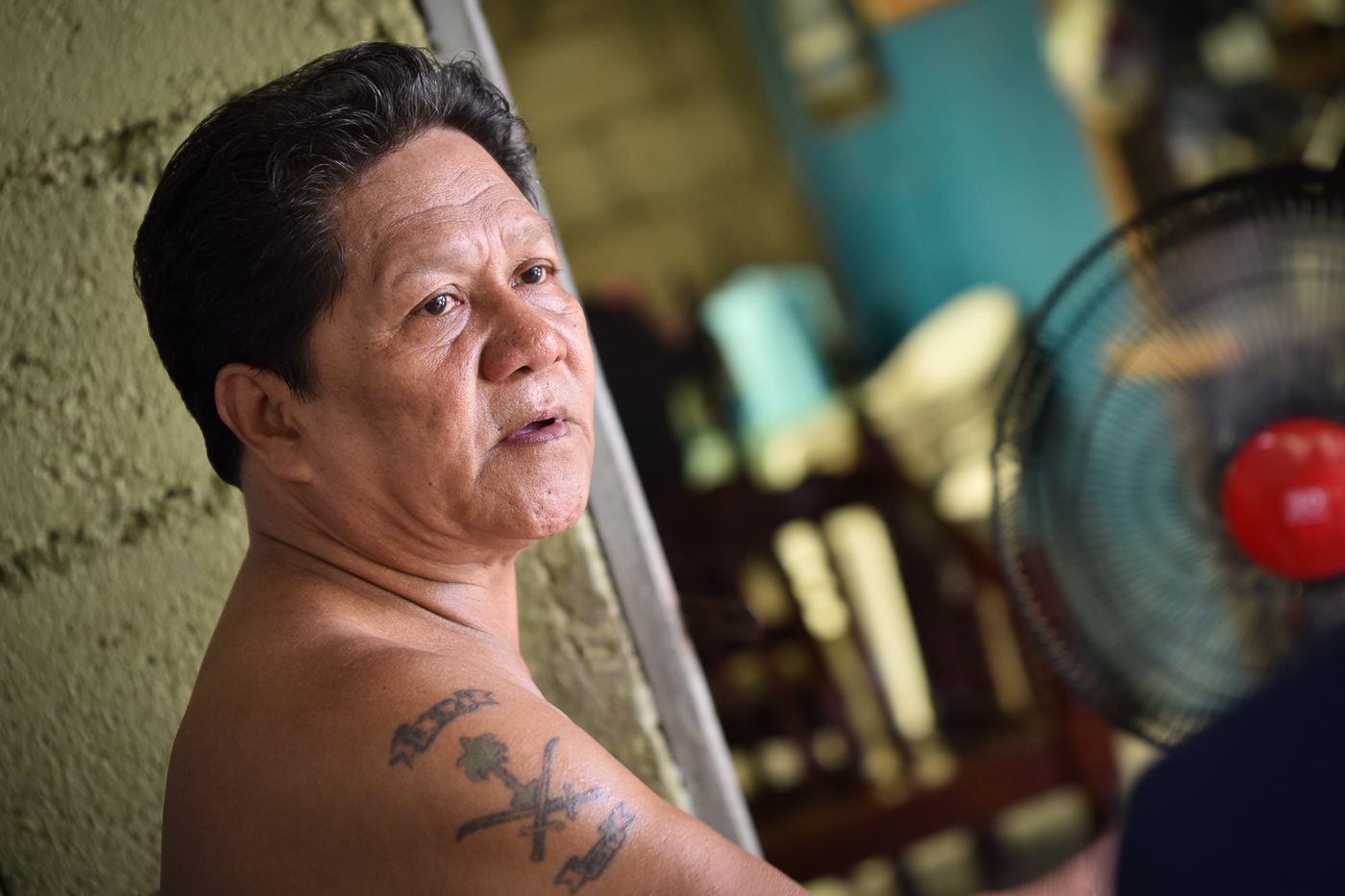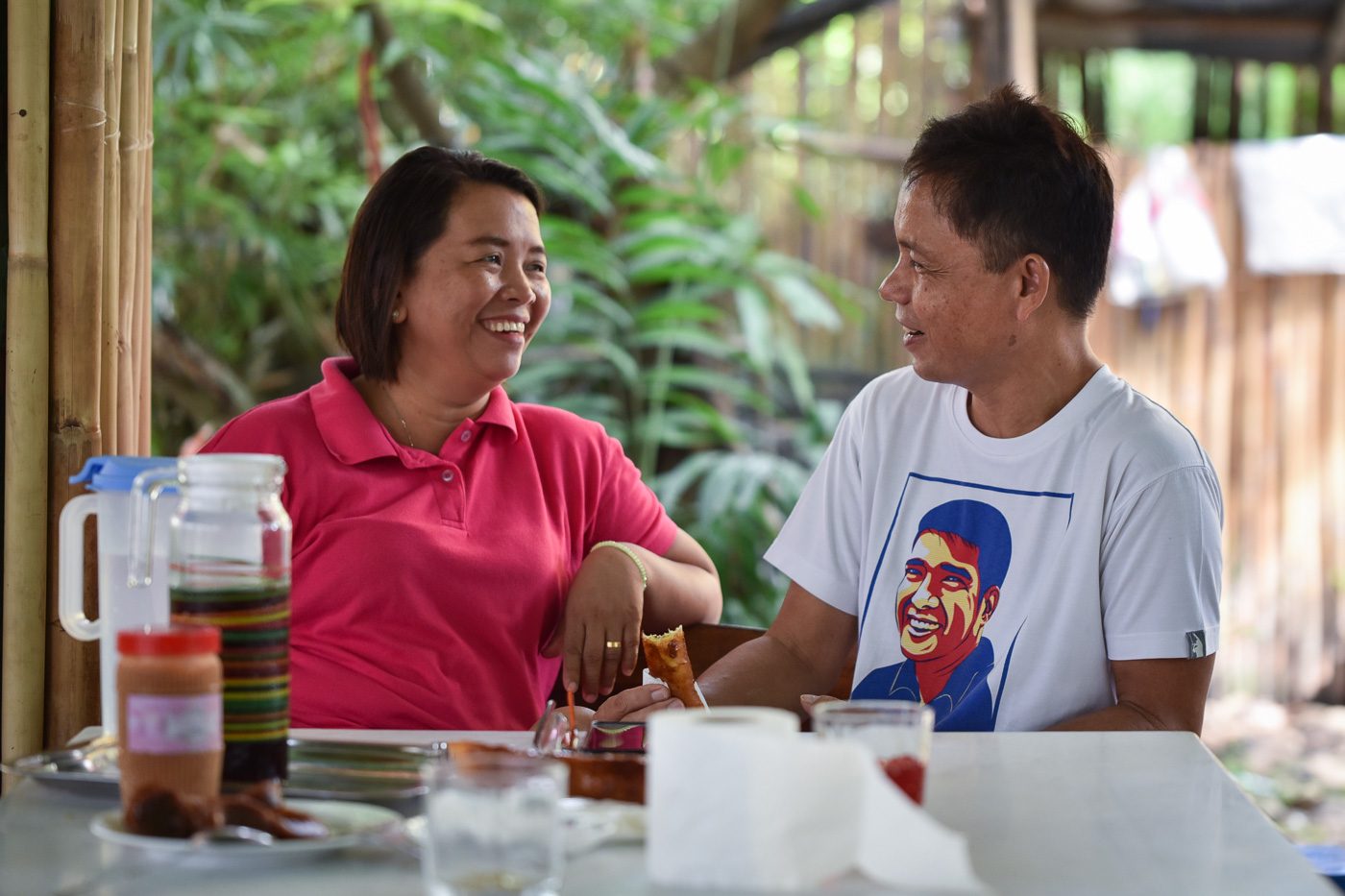SUMMARY
This is AI generated summarization, which may have errors. For context, always refer to the full article.

MANILA, Philippines – Rustico Lacostales heaved a heavy sigh of relief when he arrived home for the very first time after two decades of undocumented stay in Saudi Arabia.
Lacostales, 60, said he left the Philippines in 1990 following his wife’s suggestion. A lot of their neighbors were flying out for work abroad so even if he had a decent job here, his wife asked him to look for better opportunities as well.
Everything was well and good since he was able to regularly send money he earned by working as a mechanic. But that lasted for only 6 years.
The shop where he worked eventually closed and his employer cum sponsor fled with his passport. He never renewed it since and instead resorted to hiding in alleys whenever Saudi Jawazat – the authorities responsible for checking immigrants’ documents – came close.
Then very desperate, Lacostales survived by working in between casual jobs and relying on the goodwill of other OFWs there.
The Institute for Labor Studies (ILS) in 2016 noted that OFWs have a low level of return preparedness, both financially and socially.
“Sa Saudi, wala akong ginawa kundi umiyak talaga. Parang nawalan na ako ng pag-asa na makapiling ang pamilya ko. Nawalan na ako ng pag-asa, ang dinanas ko, napakahirap talaga,” he said. (All I did in Saudi was to cry. It was like I already lost hope to be with my family again. I already lost hope with all that I went through. It was really tough.)
His face displayed a hint of exasperation when he recalled how tough it was trying to go home. Several times, he had to walk to the Philippine embassy under the humid heat of Saudi to apply for repatriation, only to be rejected.
It was only through the amnesty program initiated by the Saudi government in 2017 that Lacostales was given the chance to see his family again. He was among the thousands of illegally staying OFWs sent home to the Philippines before the government started its crackdown.
But his struggle continued even after setting foot on their doorstep on June 17. He didn’t realize that re-connecting with his family after 25 years of separation – without constant communication – would be equally challenging.
“During my first month here, I felt that my children and wife were emotionally distant from me. They were saying different resentments towards me. But I just let it pass because I just want a new life, to be with them,” he said.
Coupled with the cold treatment was the regret that he missed out on parenthood and seeing his children grow up.
“Mga anak ko dinadaan-daanan lang ako, hindi ako kinikibo,” he said. “Iniwanan ko iyong mga anak ko maliliit pa, hindi ko naman nakasama mula’t sapul…Pinapakiramdaman ko bawa’t isa kung ano ang mga ugali nila.”
(My children and I saw each other but they didn’t talk to me. I left them when they were just kids. I had never been with them since…. Now, I’m trying to figure out their personalities.)
Lacostales took on every household chore day and night to win his family back in the simplest ways he could.
“Ginagawa ko lahat ng panunuyo… Ang asawa ko paggising pinagluluto ko ng babaunin niya. Pag-uwi sa hapon, pinagtitimpla ko ng kape.”
(I am doing everything so they would warm up to me. I prepare my wife’s packed lunch for work and when she goes home every afternoon, I make her coffee.)
His wife and children are slowly warming up to him. He’s unsure how the situation will completely turn around but giving up on rebuilding life with his family would be the last thing he would want to do. (READ: How Duterte gov’t plans to bring OFWs back home)
Psychological reintegration
Labor migration has been part and parcel of the lives of Filipinos. The Philippine Statistics Authority (PSA) estimates that there were a total of 2.2 million OFWs in 2016.
Several policies, programs, and institutions try to address the demand to work abroad. Philippine civil society, meanwhile, is conscious about the social cost of oversea parenting – thanks to a number of studies that link labor migration and its psychological effects on children and spouses.
On the other side of the migration spectrum is return and reintegration – discussed only in a limited manner in the economic or financial aspects of the issue. It entails access to jobs and livelihood after a worker’s stint abroad.
Resources often do not capture the reality that homecoming also impacts on a worker’s psychological state – the uncertainty of leaving a high-paying job or the anxiety over missed parenthood.
‘Mga anak ko dinadaan-daanan lang ako, hindi ako kinikibo… Iniwanan ko iyong mga anak ko maliliit pa, hindi ko naman nakasama mula’t sapul.’
A study by the Department of Labor and Employment’s (DOLE) policy arm, the Institute for Labor Studies (ILS), in 2016 noted that OFWs have a low level of return preparedness, both financially and socially. (READ: Changing the narrative on OFW reintegration)
“Return may only refer to the physical return of a migrant to their country of origin while reintegration is a process to which the migrant is re-introduced and re-inserted to the community under 3 identified dimensions: economic stability, social networks and psycho-social,” said the ILS policy paper.
Ronnie Abeto, a former migrant worker and an OFW rights advocate, had prepared himself on both fronts even before he went back home in 2014 after 20 long years in Saudi Arabia.
His story is not as depressing as Lacostales’ but the adjustment was inevitably challenging. Abeto took a year before finally getting comfortable again with the old but seemingly new environment he found himself in.
Among the obstacles he had to go through in his reintegration process was facing relatives and friends without the pasalubong or gifts they have been used to in the past.
“When I arrived here, the first thing I dealt with was my social life. When you are a balikbayan here, you are used to giving presents to relatives and friends you meet. I felt I can’t face them without the gifts,” shared Abeto in Filipino.
He and his wife also had to go through some psychological hurdles in reviving their relationship, which for the longest time had been kept alive via phone calls 3 or 4 times a day. He described it as being akin to getting back together after a break-up.
Since both of them were used to being independent, living under one roof again stirred conflict in their daily lives. In addition, they’ve had to catch up on the years spent living apart.

“[I had] to make up for those good old days that you had but lost (because you left)… Parang nagkagalit kayo at nag-mend ways… Manunuyo ka at iiwasan mo muna na huwag masaktan,” he said. (It’s like you went through a rough patch and mended ways. You have to woo her again and keep her from feeling hurt.)
Letting it pass
Although these may seem superficial, these are real concerns among OFWs. Carlos Lagaya of non-governmental organization UGAT Foundation said that these are the top problems returning migrants they work with tell them about. UGAT Foundation has been hosting several counselling programs for the sector since 2008.
“Common problem they encounter is that they do not know each other. Kids do not know who their fathers are… and fathers do not realize that their children have all grown up; that the kids they left are now teenagers who have their own social kids, social groups,” said Lagaya.
When it comes to the financial aspect, he said that some OFWs fail to handle the pressure as a result of their friends’ and family’s perception of their social status.
“Lumiliit na iyong mundo nila. Dati nakakasama sa gathering, dati kapag may family reunion sumasama. Pero hindi na sila nakakasama kasi iyong feedback, di nila matanggap…. Tayo kasi sa Pilipinas, ang expectation natin sobrang taas [na] ang daming pera nito, ang daming pasalubong,” he added.
‘[I had] to make up for those good old days that you had but lost (because you left)… Parang nagkagalit kayo at nag-mend ways… Manunuyo ka at iiwasan mo muna na huwag masaktan.’
(They don’t attend gatherings or family reunions like they used to. They can’t accept the feedback. Because people here in the Philippines have so many expectations of OFWs – that they have a lot of money and gifts.)
The worse part is, they go through it alone, in despair.
The ILS study found that 1% of returning migrants avail of government’s basic counselling services. Perhaps awareness could be behind this low utility since a little over half of the returnees are aware of the programs available to them. But findings also showed that only 2.3% believe that psycho-social intervention is something they need.
Lagaya thinks it is because of the stigma associated with psychological treatment. It was difficult getting participants for their activities. But families reach out to them when their situation becomes severe.
UGAT Foundation hosts the program called Kapiling Muli (Together Again) specifically for OFWs having trouble reconnecting with their families. They allow their participants to air their sentiments in a free space since parents are separated from their children.
Afterwards, they gather them in one session where they help them process their emotions and thoughts to talk their issues through. Depending on the case, the group provides individual counseling to the family. Their services are free of charge but a donation of any amount is appreciated.
“Kapag nabasa mo iyong mga letter, maiiyak ka kasi may nababasa ako doon na ‘buti pa iyong lupa nadadalaw mo, buti pa iyong puno, halaman. Invest kayo nang invest pero hindi kami naaalagaan,’” he said. (When you read the letters, you’ll want to cry because I’ve read letters that say, ‘You can visit your property, your farm, you keep on investing, but you fail to take care of us.)
“Ang maganda lang kapag talagang nasosolusyunan, una, nagkakasundo ang pamilya kaya alam na nila ano’ng dynamics. Pangalawa, ayaw na nilang maulit ang nangyari… [may mga anak] ayaw na nilang mag-abroad, ayaw na nilang mangyari iyon,” he added.
(The good thing about solving this is, first, the family members get to understand each other, they now know the dynamics. Second, they realize that they do not want this to happen again…there are kids who don’t want to work abroad because they don’t want to have the same fate.)
The government, through the Department of Social Welfare and Development, also offers psychological intervention both for families left behind by OFWs and workers who have already returned to the Philippines.
Raising awareness about these available services is as important as helping OFWs realize the other side of the reintegration process. – Rappler.com
Add a comment
How does this make you feel?
There are no comments yet. Add your comment to start the conversation.